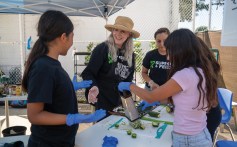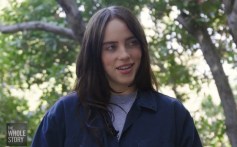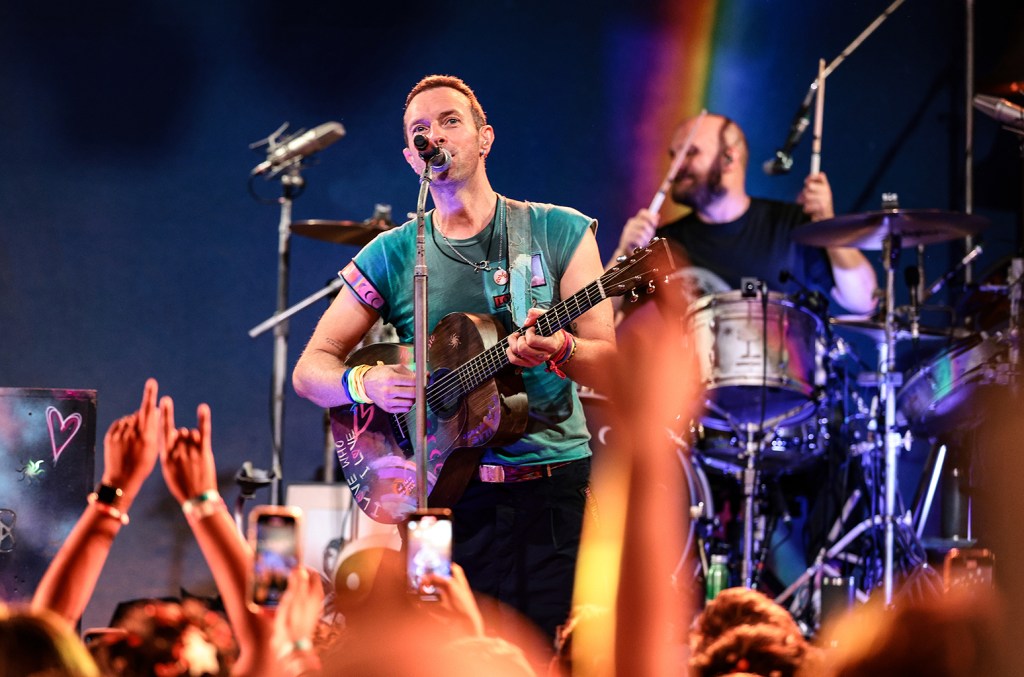sustainability

Trending on Billboard
After a year-long hiatus, Envision Festival is returning to Uvita, Costa Rica this February. Attendees will once again be able to revel in the electronic-focused music, workshops and lush jungle setting that have defined the fest since its 2011 debut. Now, Envision organizers are announcing a host of changes and upgrades designed to optimize the 2026 edition.
Explore
See latest videos, charts and news
“We have listened, and we have put changes into action,” Envision co-founder Josh Wendel tells Billboard. “We are now ready to share how we are evolving and how we will deliver a better experience.”
On Monday (Nov. 10) Envision organizers unveiled a long list of improvements for the 2026 fest, happening Feb. 23-March 2 at its longtime site in a beach-adjacent swatch of jungle on the Pacific Ocean side of Costa Rica. The festival’s phase one lineup includes Bob Moses, CloZee, Daily Bread, Emancipator, Goldcap, Justin Martin and many others, with more artist to be announced in the coming weeks. Envision also offers a wide array of yoga, movement and sustainability classes, along with other workshops.
The announced changes follow a challenging 2024 edition, which found attendees citing sanitation issues and some attendees reporting that they experienced gastrointestinal illness while at the fest. Envision did not happen in 2025 as organizers regrouped, with Wendel transitioning from his production leadership role to leading the entire event, of which he also became the sole owner.
“After 2024 there were operational challenges we acknowledge that we had to fix, so in 2025 we chose the theme ‘back to our roots,’” Wendel says of the 2026 event’s guiding ethos. ” It was like, ‘What are we doing? Why are we doing it? How are we doing it? It became this deep, introspective journey of dissecting every little element of why I initially started it and the impact that it’s had.”
Originally from Florida and a Costa Rica resident for the last 22 years, Wendel speaks to Billboard from his home in Costa Rica, joking that he’s usually barefoot in the jungle. The updates he and the team developed emphasize that health and safety is Envision’s top priority and note that an audit of the 2024 event revealed multiple reasons for why people experienced GI issues, with “many people [getting] sick from viruses that were brought into the festival by travelers coming to the festival. For many people, moving into the jungle environment of Costa Rica and being exposed to different microbes is enough to trigger GI issues.”
Organizers are unrolling multiple methods for eradicating these issues in 2026. “It’s a hyper-focus on safety, on our medical team and on analyzing every which way that we can do that, including having a medical supervisor and a different medical team,” says Wendel. “You wouldn’t want to put this on the lineup poster, but health and sanitation are our headliners this year.”
As such, 2026 attendees will find separate stations for hand washing and water bottle refills. (While they were also separate in prior years, attendees did not treat them as such, so water will thus become a destination via a dedication water refill station called the Templos de Agua.
“It’s the jungle, and people are coming from all over the world to gather,” Wendel continues. “Obviously there is the self-care component we must continue to message to make sure people practice self-care as we give them the tools to do that. Wash your hands, use hand sanitizer, get some sleep, take care of yourself.”
As such, each festivalgoer will also be provided with a comprehensive guide to staying healthy while in Costa Rica that’s been developed in partnership with local doctors, health professionals and the Costa Rican Ministry of Health.
Another major change is the approach to toilets. Envision 2026 will provide more port-a-potties with more frequent pumping and better placement. Envision 2024 debuted a waterless, off-grid sanitation model using dry-composting toilets. The 2026 fest will improve upon this system by swapping out all tanks prior to guest arrival, so each system is fresh and empty at the start of the event. Carbon filters and improved ventilation will also be installed to reduce bathroom-related odors and increase airflow. A dedicated onsite maintenance team will service toilets more frequently during the fest to optimize cleanliness, hygiene and comfort.
After the festival, waste from these dry-composting toilets will be sealed and transferred to a long-term curing area where it will compost for 12–18 months, ensuring full pathogen elimination before it’s used for off-site organic fertilizer.
Envision has also brought in a new medical director, a Costa Rican doctor whose experience includes working with international film and television productions in the country and who is also part of a team that provides medical assistance to large-scale events in the U.S. This person will also work with a local medical team and in partnership with a local clinic, hospital and Ministry of Health and help hire more local people for the Envision lifeguard team that keeps watch over the festival’s beach area.
Expanded sustainability initiative will include water conservation guidelines and compostable cups, plates silverware and other serveware. Organizers predict that these compostable items will significantly reduce water consumption by eliminating the washing necessitated by a now phased out reusable dish program. Along with the water-free composting toilets, the production team is also installing low-flow showerheads and encouraging short showers for all guests.
“We’re not a luxury hotel,” says Wendel. “It is the jungle, and we are committed to doing everything to make it as convenient and comfortable and as easy as possible.”
Envision is also working closely with community partners and the organization who manages the local water supply to create a new on-site water system that ensure that the fest will have enough clean water and will also reduce the impact of Envision on the water flow of the nearby town. This system has been designed experienced engineers and will include filters, pumps, treatment, storage tanks and water distribution infrastructure.
Envision Festival
Courtesy of Envision Festival
These programs are particularly crucial given that Envision happens in an environmentally sensitive area, with the lush jungle setting, beach access and deep nature immersion provided by the fest being a huge part of its appeal. Envision happens at Rancho La Merced, located less than a mile north of the breathtaking Marino Ballena National Park, a protected marine sanctuary that’s home to humpback whales, spotted and bottlenose dolphins, manta rays, parrotfish and mackerel.
The festival site, which Envision leases from its owners, is itself home to emerging mangrove forests, creeks, freshwater canals, a host of tree and plant species, birds, monkeys and other wildlife.
“People come for the headliners, but then they’re barefoot in the jungle and jumping in that ocean, and doing yoga and drinking from a coconut and seeing monkeys and something clicks,” says Wendel. “People get inspired. The music is like a bait-and-switch.”
But there is of course the push/pull of bringing thousands of people (many of whom are looking to party for a week) to such a ecologically delicate area, an issue many festivals that happen in special places in nature must grapple with. “When you talk about environmental impact, I look at it as 10 steps forward, then one step back, with a little traffic and boom boom bass [during the festival itself], then 10 steps forward,” says Wendel.
Envision has put this into action by reforesting the site, where many of the trees were cut down in the mid-20th century to make space for a cattle pasture. Over the years, Envision has helped plant Ylang Ylang and fruit trees throughout the grounds and at Rancho La Merced and has also planted beach almonds in the campgrounds for shade. Before and after photos from 2014 to 2024 show an impressive expansion of trees and foliage on the site. Organizers have also worked with local organizations to plant in the surrounding area to protect water sources and provide biological corridors throughout the Rancho La Merced property.
Envision Festival
Auudrey
To mitigate the impact of attendees on the festival on the site, the 2026 edition will also reduce capacity by roughly 2,000 people, bringing down overall attendance to approximately 5,500. (The amount of temporary infrastructure built on site will also be reduced.) This decreased headcount also factors in reducing travel from international Envision staff, with the focus being to hire as many local people as possible to mitigate impact, create jobs and keep the event local.
The fest is also leaning into this local component by bringing in more products from local vendors. This will include local produce kombucha brewed in Uvita, beer from nearby Dominical, cacao from local regenerative farms and herbal elixirs, mixers made in the region using native plants and locally grown herbs and compostable plates, cups and containers made in Costa Rica.
All of these changes are coming in tandem with a phase two lineup Wendel calls “by far the most exciting phase two that we’ve ever had.” While he’s tight-lipped about who it might be, he says this lineup expansion will likely be announced this month.
Over Zoom Wendel seems sincerely excited these changes and clear-eyed about the reasons for them. Many event producers often receive severe verbal abuse on social media when elements of an event go wrong, an experience Wendel says was not necessarily pleasant, but ultimately useful.
“Even when the feedback comes off as ugly and emotionally vomiting, I’m never losing sight of who I am or who we are as an organization. It’s about being able to pull out what valuable information I can that can actually make this event better.
“It’s psychological warfare right now, with the amount of anger, frustration and hatred,” he continues. “So [for me] it’s about asking how we can be vulnerable leaders? How can we be honest? How can we be humble? It’s about acknowledging mistakes and being proud of your desire to grow and learn from those mistakes… I’m making the best decisions I can make from the best information I have.”
Trending on Billboard
Sounds Right, a charitable cross-DSP playlist featuring music that incorporates the sounds of nature, will now allow any artist to submit their music to the project, it was announced Wednesday (Nov. 5).
Sounds Right initially launched in April 2024 with a playlist featuring new and older tracks with sounds like bird calls, waves, wind and other greatest hits of the mother nature soundscape, woven into music by artists like David Bowie, Brian Eno, Hozier and Ellie Goulding. Royalties generated by this music, which includes 36 original songs that were added this past April, are directed to conservation efforts.
Related
Now, as scientists and activists from around the world gather in Belem, Brazil for the COP30 UN Climate Conference (Trump administration officials recently announced that no high-level representatives from the U.S. government will attend the event), Sounds Right has announced an update that allows artists to help fund conservation work by officially crediting “Nature” in their music and submitting it for inclusion on the playlist.
Accepted submissions will be incorporated into the Sounds Right playlist, with 50% of royalties raised from any given song going to the artist and the other 50% going to environmental causes. Submissions are open now.
This past Saturday (Nov. 1), Sounds Right announced that the project has so far raised a total of $400,000 for Indigenous and community-led conservation in the Amazon and Congo Basin regions, building on $225,000 it directed to projects in the Tropical Andes in 2024. The funds were announced on stage at Saturday’s Global Citizen Amazonia concert in Belem, which was broadcast throughout Brazil.
Related
Sounds Right has now added 14 new tracks to the playlist, all of which celebrate the natural world of the Amazon and Africa. The Amazonian contributions come from artists Alexia Evellyn, Pedrina, Antonio Sanchez, Chancha Via Circuito, Systema Solar and Monte (aka Simon Mejia), while the music of artists Juls, Phila Dlozi, Olivetheboy, Bien, Blinky Bill, and Lady Donli showcases the sounds of the Congo Basin region.
“This collection of tracks is a powerful expression of how artists can use their creativity to celebrate and protect the natural world at such a critical moment for our planet,” EarthPercent co-executive director Cathy Runciman tells Billboard. “From Alexia Evellyn recording the rhythms of the Amazon’s rivers and birds to Juls blending Congo Basin forest ambience into Afrobeats, and Antonio Sánchez turning birdsong into percussion, it’s inspiring to see such diverse artists uniting to honor these vital ecosystems and leading a movement to bring nature back into music and culture.”
“It’s an honor and a thrill to be part of Sounds Right,” adds the Grammy-winning Sanchez, whose contribution “Drumming with the Birds” explores the percussive rhythms of Amazonian birdlife. “I believe it’s vital to keep opening new avenues for people to connect with the importance of preserving and protecting Mother Nature. This collaboration, inspired by the Amazon and its remarkable avian life, celebrates that connection. I hope you enjoy it as much as I enjoyed creating it.”
Brazilian producer Alok will also soon release a special track for the Sounds Right project, with the artist saying in a statement that “nature has always played an essential role in music, and the time has come for it to be recognized for that.”
Trending on Billboard
Imagine the distance between Las Vegas and Chicago. Now imagine a line of 20 million stacked plastic cups and single-use serveware items extending along the 1,700-mile route.
According to reuse company r.World, that’s the actual cumulative number of plastic cups and single-use serveware items it and its partners have kept out of landfills since r.World launched in 2017.
Related
R.World provides reusable cups and serveware to venues and events, which are then returned by fans and sent out for cleaning at nearby r.World wash stations. R.World products are now in and at venues and events including Crypto.com Arena, Peacock Theater, Red Rocks Amphitheatre, Warped Tour and myriad Goldenvoice festivals. The company has also partnered with artists including Chappell Roan, Billie Eilish and Coldplay.
According to r.World, its work has thus far stopped more than 110 tons of plastic from being produced (netting out any plastic the company itself used), thereby eliminating 440 U.S. tons of CO2 emissions, saving 1,650,000 kWh of energy and conserving 5,000,000 gallons of water — amounts representing the creation and transport of these single-use items. Every cup or piece of serveware the company delivers that’s then returned is counted to ensure accurate environmental impact tracking and reporting.
“There is tremendous new growth in the world of reuse,” r.World founder Michael Martin tells Billboard. “When we launched the reuse movement back in 2017, no one was doing reuse. Now NFL, NBA, NHL, MLS, MLB and college stadiums are implementing reuse. As more and more venues realize the economic and environmental benefits of doing reuse, we are adding more clients every month.”
Martin says the company will be announcing a host of new partners in the coming weeks. Still, amid this growth, he says the biggest hurdle remains the fear of change and misinformation that exists in the marketplace, along with an “imagination gap” in terms of how reuse works. He notes that reuse can save venues money; that it’s a “vastly better” environmental solution than single-use aluminum cups, compostable cups, souvenir cups or plastic cups; that the reuse system is easy; and that guests and servers love it.
Related
“Reuse is common in most developed countries. The U.S. was behind,” Martin says. “As more and more U.S. venues are discovering the benefits of reuse, the demand is skyrocketing. The country’s leading venues are moving to reuse and away from single-use.”
Many scientists have noted that the world is currently in a “plastic crisis,” with these items contaminating natural spaces and waterways, harming wildlife and humans. Health Policy Watch reports that 98% of plastics are made from fossil fuels, with plastics “polluting human health through an array of pathways, including direct exposure to waste fills or chemical plants, environmental contamination, absorption through food packaging, microplastics, air and soil pollution, and burning of feedstock fossil fuels.”
R.World is one of several initiatives aimed at dramatically bringing down the use of single-use plastics in the music industry and beyond. In September, electronic producer Blond:ish announced Zero Plastic Club: NYC, a project that’s working to rid New York City dancefloors of single-use items like bottles, cups and wristbands.
“The movement toward reuse is a collective effort, built on partnerships and shared values, with contributions from venue managers, beverage companies, promoters, artists, and fans,” says Martin. “Every time a fan returns a reusable cup instead of throwing one away, they play a part in a larger transformation.”

Trending on Billboard
When it comes to convincing major artists to use sustainable merch on tour, it doesn’t take much work, says Bravado president Matt Young. As he puts it, a little competitive spirit goes a long way.
“For us, it’s just about using the platform to tell the story,” Young said at the Billboard Live Music Summit on Monday (Nov. 3) in West Hollywood, California, noting that stars including Billie Eilish, Paul McCartney, Shawn Mendes and Lorde used sustainable merch options on their most recent tours. “And it gets our competition to follow suit. The artists are saying, ‘Hey, how come we can’t do that?’”
Related
Young was speaking during the panel “Building Touring’s Sustainable Future With Maggie Baird.” Moderated by Billboard senior music correspondent Katie Bain, the panel also featured Adam Gardner, frontman of the band Guster and co-founder of the environmental music nonprofit REVERB; and Maggie Baird, founder of nonprofit Support+Feed and mother of Eilish — arguably the most outspoken major artist on the subject of sustainability.
Below are four major highlights from the panel.
The price point for sustainable merch is trending down as more artists adopt it.
While noting that sustainable merch tends to be “a few dollars more” than non-sustainable, Young said that once artists and their teams realize it’s an option, they tend to be open to it.
“The ultimate sell is, ‘This is the right thing to do,’” said Young. “A few months ago, we did a summit in Nashville, where we were sitting down with partners in town and just talking about the options. And half the time, they go, ‘I didn’t realize that.’ And the other part about this is, because we’ve done so much over the last three or four years, we’re starting to see the price gap close a bit.”
Related
Added Gardner, “Once enough artists are asking for the same things, they make permanent change.”
Offering plant-based meals at concerts is actually cheaper.
You know which sustainable option is actually less expensive than the status quo, according to Baird? Plant-based food. That’s helpful when it comes to her organization, Support + Feed, selling organizations on offering more non-meat options.
“One of the whys [to offer plant-based options] is you can save money,” said Baird. “That’s really an important part of the storytelling, is getting arenas to understand it’s actually cheaper to serve whole, plant-based foods. And then we offer tools — tools about menu guidance, creating dishes, how to sell more of them. You don’t just put the vegan option at the bottom [of the menu]…you want it to be No. 2.”
Some sustainable options take a little more convincing than others.
In attempting to sell artists and their teams on battery-powered vs. traditional diesel-powered generators, Gardner says it took proof of concept to get more artists on board. That proof of concept came courtesy of Eilsh, who partially powered her headlining seat at Lollapalooza 2023 using zero-emissions battery systems, charged using solar power, without a hiccup.
Related
“The first step was just convincing folks that it was feasible and that it was okay,” said Gardner. “Because obviously, when you’re talking about powering the stage, nobody wants the power to go out during a concert. So it is scary, and yet it’s also necessary.”
Once Eilish’s 2023 Lollapalooza set proved it could work, the festival “has continued to use battery[-powered generators] since that year.” In 2025, Lollapalooza announced its main stage would be entirely powered by a hybrid battery system — a joint effort by REVERB, C3 Presents and Live Nation’s Green Nation sustainability initiative.
This is just the beginning.
While some strides have been made on the sustainability front in the touring business, there’s still a lot more work to be done. As Young optimistically put it, “The beauty of this is, every day, there’s a new, innovative, entrepreneurial company trying something new in this space.”
He added, “We’re just getting started.”

Trending on Billboard
It’s the tail end of September’s Climate Week: NYC when Maggie Baird gets on Zoom from her hotel in the city, ceramic mug of tea in hand.
The mother of Billie Eilish and FINNEAS, as well as a staunch activist for sustainability and plant-based food access, Baird calls her time at Climate Week a “mixed bag of emotions”: She has participated in troubling events addressing the grim effects of climate change, but has also learned about the more hopeful work that’s happening around the world to address it.
“It’s a very dark time and there’s a lot going on,” she says. “Climate change is a threat multiplier. Every single other issue you care about, climate is there making it worse.”
Maggie Baird will participate in a panel at Billboard‘s Live Music Summit, held Nov. 3 in Los Angeles. For tickets and more information, click here.
Related
But Baird, who quotes Joan Baez’s famous “Action is the antidote to despair” declaration, has been a force during the event. Support + Feed, the organization she founded in 2020 that provides hot, plant-based meals to people in need, distributed roughly 2,500 of these meals, along with pantry items, across New York. She and representatives from the nonprofit used this time in the community to talk about plant-based diets as crucial mechanisms of positive environmental impact, with the week’s efforts also connecting various community organizations with climate thought leaders. The week ended with a Support + Feed “friend-raiser” event that hosted climate activists, community members and celebrities like Martha Stewart and Eilish, who turned out to support her mother.
“The main thing I would say about this time is that it’s a moment for radical collaboration,” Baird says. “Every organization I know and work with, we’re just like, ‘How can we be better together?’ We have to multiply — exponentially.”
For Baird, however, every week is Climate Week. Having worked with her children and their respective teams to meaningfully integrate sustainability into their careers, she’s essentially a frontline reporter on sustainability within the music industry.
One sector where she’s seeing “really exciting advances” is merchandise. Baird is a longtime collaborator with Bravado, the merchandising and branding division of Universal Music Group that recently sent 400,000 obsolete and unsold tour T-shirts and other unused items by ship from Nashville to Morocco, where they were repurposed into new yarn by sustainability-focused textile manufacturer Hallotex. The yarn will be used to make new items in Europe to avoid the emissions of shipping them back.
Maggie Baird, Finneas, and Billie Eilish at the Support + Feed Fall Fundraiser Event on Oct. 24, 2023.
Zoe Sher
For Eilish’s merch, the Bravado team has successfully collaborated with upcycling and sustainability-focused clothing companies Rewilder and Suay and designer Iris Alonzo, the co-founder of the Everybody.World brand. Suay, for example, took hundreds of dead-stock work shirts, added sleeves and embroidered “Billie” on each piece, while some of Eilish’s old merch was repurposed into bags. “The upcycled items sold out so fast,” Baird says, “because there were limited quantities and they were extremely unique, and unique to Billie.”
Meanwhile, a program developed by Eilish’s Live Nation touring team, Support + Feed and Reverb, the long-standing nonprofit focused on music industry sustainability, now requires that any venue hosting an Eilish show must sell at least three plant-based main courses — and some venues have even gone entirely plant-based for Eilish. (Her sold-out Hit Me Hard and Soft world tour began in fall 2024 and runs through November.) The team also hosts educational webinars for venue culinary staffers to educate them about plant-based eating.
“It’s about trying to help them understand that the arena has an obligation to clientele, to planet and to cost,” Baird says. “It’s all done in a friendly, helpful way. We’re very welcoming and excited that they’re willing to even take the call, frankly.” The goal is for venues to maintain more robust plant-based approaches long after Eilish leaves. “It’s really about helping people understand that you’re not just serving your customer better while being better for the planet,” Baird explains, “but that you can actually save money.” These savings are achieved by reducing reliance on meat and incorporating more dishes made with lower-cost ingredients like beans, lentils, grains, fruits and vegetables; meals built around whole-food ingredients are often significantly more affordable to produce.
She is aware that implementing such programs takes resources. Eilish has helped fund Support + Feed and Reverb to be on-site at shows by rising artists who don’t yet have the funds to host these groups themselves. “I think it’s important that we reach down,” Baird says. Fans can also buy more expensive “changemaker” tickets for Eilish’s shows, with 50% of the revenue from each tagged for sustainability projects. One dollar of every regular ticket sold is also donated.
While Eilish is among the most visible musicians promoting sustainability in the industry, Baird’s hope is that even if artists don’t want to publicly discuss their efforts, “they’ll still just do it. They don’t have to make it as outward as what we’re doing, but they can just do it as a given.”
Maggie Baird and Hayley Williams of Paramore deliver meals on June 28, 2023, as part of Baird’s volunteer work for her nonprofit organization, Support + Feed.
Zoe Sher
All these initiatives are happening in a year when Support + Feed has responded to a host of disasters. It fed locals in Los Angeles following the devastating California wildfires in January and in Tennessee after intense flooding in April. (Baird notes that in the wake of such events, Support + Feed representatives stay on the ground long after many other response organizations move on to the next crisis.) The communities Support + Feed serves have also been “very impacted” by U.S. Immigration and Customs Enforcement raids, “so we’ve had to really be nimble in how we feed people and how we convene,” Baird says.
Still, the organization is expanding its offerings, now providing, in addition to hot meals, free produce from local farmers and cooking classes and recipe cards for people who may be unfamiliar with the produce they’re receiving.
“We’re really increasing our education and our outreach as much as possible,” Baird says, “but also just feeding, feeding, feeding, feeding, feeding. The need now is tremendous with all the food programs being cut.
“It’s a very intense time,” she continues, “but there are so many people doing great things.”
This story appears in the Oct. 25, 2025, issue of Billboard.
Trending on Billboard
Seemingly small initiatives can make a big impact when it comes to making festivals greener — a point Oregon’s Cascade Equinox Festival is demonstrating with its ongoing sustainability program.
The festival’s third edition happened Sep. 19-21 in Redmond, Oregon, with organizers once again implementing a program they say has helped plant hundreds of trees and protect thousands of acres of rainforest in the event’s first three years.
Related
The program is designed around the “Eco-Band initiative,” which allows attendees to upgrade their passes to include a 100% hemp wristband for $20. A representative for the event reports that this year’s program raised enough money to plant 394 trees in Oregon forests and to protect roughly 511 acres of land in Ecuador. Another roughly $700 raised through donations on the festival’s website went to the protection of another 177 acres of the same Ecuadorian land, which is home to jaguars and Andean bears.
Since Cascade Equinox’s 2023 debut, the hemp wristband program has raised funds to plant 601 trees in the local Willamette National Forest and to protect 1,665 acres of Amazon rainforest. The latter initiative has been done in partnership with SAVIMBO, an organization founded by Indigenous leaders in the Colombian Amazon that pays Indigenous peoples and subsistence farmers in tropical forests to preserve these ecosystems. The festival’s project has specifically worked with the Cofán Indigenous Community in Chandia Na’en, Ecuador.
The hemp wristband program was executed in partnership with Green Disco, an organization composed of promoters, producers and environmental experts who consult on live events, along with Earthwin.org, which works to expand education on mindful living for global well-being.
“Sustainability is a core principle for Cascade Equinox, and in leading by example we hope that other festivals notice and make similar efforts and improvements,” festival organizer Josh Pollack tells Billboard. “We’re thrilled to have planted over 600 native trees locally in Oregon and preserved over 1,600 acres of Amazon rainforest in Ecuador over three years. Big thanks to Earthwin and Green Disco for being incredible partners and sharing our vision for music festivals making a positive ecological impact both locally and globally.”
The 2025 edition of Cascade Equinox Festival featured artists including Sylvan Esso, Disclosure, Big Gigantic, TroyBoi and Chromeo. The next event is slated for Sept. 18-20, 2026.
Billboard‘s Live Music Summit will be held in Los Angeles on Nov. 3. For tickets and more information, visit https://www.billboardlivemusicsummit.com/2025/home-launch.
Trending on Billboard
The nonprofit Bye Bye Plastic Foundation, founded by DJ/producer Blond:ish, has announced a landmark partnership with the booking-and-tour-management platform Gigwell, opening access for artists, managers and booking agents to integrate the new Eco-Rider 2.0 sustainability toolkit into their touring plans. The move is part of a larger push to make eco-conscious touring mainstream.
The original Eco-Rider, introduced in 2019, has already been adopted by more than 1,500 DJs and performers worldwide, helping prevent more than 325,000 single-use plastic bottles and 425,000 cups from entering circulation, according to the Bye Bye Plastic Foundation. With the roll-out of Eco-Rider 2.0 via Gigwell’s platform, artists will now be able to opt in to a full-scale sustainability rider during the booking process. By doing so, they will force promoters and venues will be to shift toward greener hospitality, eliminate plastics backstage and front-of-house and embed eco-requirements contractually.
Related
“When I started using the eco rider, 100 percent of my events were using plastic,” said Blond:ish in a statement. “Now I’m down to 20 percent. And not even just in the DJ booth, but the actual entire event is single-use plastic-free.”
Gigwell’s CEO, Jeremie Habib, said his platform was uniquely poised to scale this change thanks to its integrated tour-booking tools, venue-database routing software and e-signature contract flows that help eliminate paper waste in the artist-agent-venue ecosystem.
The Eco-Rider 2.0 includes a full toolkit of resources, including educational content, networking spaces for artists and tour teams, and backend integration so that sustainability requirements become a seamless part of the booking workflow. Support for the initiative now includes artists such as Sam Feldt, Madame Gandhi, Yulia Niko and Mia Moretti, along with agencies like EMPIRE, Dirtybird and Protocol Agency.
The official launch of Eco-Rider 2.0 will take place at the Amsterdam Dance Event (ADE 2025) on Wednesday (Oct. 22), where Bye Bye Plastic and Gigwell will host a panel to open up dialogue and showcase how the toolkit can scale globally. From that date forward, the toolkit will be available to artists and agencies worldwide.
Learn more at gigwell.com.
Billboard‘s Live Music Summit will be held in Los Angeles on Nov. 3. For tickets and more information, visit https://www.billboardlivemusicsummit.com/2025/home-launch.

Consumer demand for live and out-of-home entertainment remains high, but Generation Z consumers — born between 1996 and 2020 — are particularly motivated to pay extra for convenience, upgraded experiences and sustainable options, according to a new EY survey. Perhaps not surprisingly, Gen Z is less patient than the average consumer. Nearly two-thirds (66%) of Gen Z respondents plan to buy a “fast pass” or priority pass to theme parks in the next year compared to 59% of all consumers, according to the inaugural EY Media & Entertainment (M&E) Pulse Poll, which surveyed 4,000 consumers across the U.S., U.K., Western Europe and the Asia-Pacific region. According to Javi Borges, EY global media and entertainment sector leader, companies that build convenience into their experiences can take advantage of consumers’ comfort with smartphone apps that offer digital ticketing and contactless payment and check-in. “When you look at the Millennials and Gen Z, there’s an expectation of a certain level of tech enablement and frictionless experience,” he says. “And even older generations post-pandemic, that maybe had never ordered Uber Eats until the pandemic, now they’re just much more accepting of the apps and the frictionless experience.” Speaking of Uber Eats, consumers’ desire for faster service is also reflected in a new McKinsey study, which found that delivery’s share of global food spending increased from 9% in 2019 to 21% in 2024, while takeaway’s share was flat and in-person dining fell to 55% from 69%. Though respondents weren’t polled specifically about music, this same trend toward speed and convenience can be traced in terms of modern-day music consumption habits, where streaming accounts for 69% of global music consumption in 2024 vs. 56% in 2019, according to the IFPI. And on the live front, concert promoter Live Nation says it now expects VIP offerings to account for 30% to 35% of its amphitheater business. Overall, McKinsey predicts that consumer tolerance for inconvenience will continue to decline as their desire for speed and service increases. Despite news headlines that consumers are at a financial breaking point, local entertainment (i.e., entertainment that doesn’t require travel) and live entertainment were purchased by 48% and 46% of respondents, respectively, according to EY’s poll. The poll focuses on companies’ pursuit of consumers’ “fun money,” which Borges calls the 10% to 15% of income people set aside for leisure activities. This segment of discretionary spending goes toward everything from music and video streaming services to concerts and vacations. “Globally, but especially in the U.S., we have more options battling for our fun money than ever before,” says Borges. Spending on live music, which offers an increasing menu of VIP options that provide greater convenience than basic offerings, is especially strong. As Billboard noted in May, a Bank of America study found that U.S. consumers spent an average of $150 a month on entertainment — such as live music and theme parks — from May 2024 to April 2025. Over the same period, credit card holders spent double that amount on live event tickets, racking up an average of $300 per month. In the same study, a third of respondents said they plan to attend more events this year than last year. Indeed, the trend in consumer spending — especially for the young, and especially since the COVID-19 pandemic — is toward experiences over material items. That said, people are willing to pay extra to make their experiences more pleasant or special. EY found that about half (49%) of respondents who visited theme parks or went on a cruise paid extra for premium options, while about a third did so for sporting events and casino/resorts. Younger demographics are also willing to spend a premium of 26% or more on sustainable features when it comes to buying entertainment experiences. For example, 12% of all consumers will spend more on carbon offsetting compared to 25% of Gen Z and 15% of Millennials. Willingness to spend extra based on water conservation practices also splits the age groups: 11% of all consumers globally, but 23% of Gen Z and 15% of Millennials. Live music has made strides to satisfy Gen Z’s preference for sustainable consumerism. Festivals are turning to batteries, sometimes powered by biodiesel or solar panels, instead of diesel-powered generators. That should be music to Gen Z ears: EY found that 24% of Gen Z would pay more for entertainment options that use renewable energy sources (versus 11% of all consumers) and 22% of Gen Z would pay a premium for lower energy consumption (versus 10% of all consumers). Looking ahead, Americans are more likely to spend money at a casino in the next year than people in other regions surveyed (66% versus 49% globally), while Asia-Pacific respondents have a greater preference for theme parks (74% versus 65% globally). About half (48%) of respondents expect to spend the same amount of money on live entertainment in the next 12 months as the past 12 months. The percentage of people who expect to spend more and spend less is almost equal at 21% and 20%, respectively.
At the inaugural SXSW London taking place June 2-7, with nearly 900 speakers participating in some 500 sessions, one specific topic was of sharp relevance to the music industry — indeed, every industry and every attendee.
The climate crisis.
The past year saw extreme weather drive fires across the music capital of Los Angeles; a cyclone prompt cancellations of some two dozen live events in Australia in a single week; and more than 50 festivals in the U.K. either postponed or canceled due to forces including higher weather-related insurance costs.
“Climate change is not some distant threat,” said Leila Toplic, chief communications and trust officer of Carbonfuture, which provides verification of efforts to remove carbon from the atmosphere.
“The business case for taking action is still there,” remarked Helen Clarkson, CEO of the the Climate Group, a non-profit whiich has worked with more than 500 multinational businesses in 175 markets. (She spoke during a panel provocatively entitled “Canceling Sustainabilty,” about efforts to purse a green agenda in the face of new anti-environmental rhetoric in Washington, D.C.)
SXSW London organizers tapped the Bellwethers Group, which is focused on building a green economy, as its the official sustainability partner and the company hosted several days of panels at the Nature and Cimate House.
One of those panels focused on the role that advertising and public relations agencies can play in guiding businesses which claim to be concerned about the climate. Lameya Chaudhury, head of social impact for the mission-driven creative agency Luck Generals, remarked: “The question we’re asking of clients in 2025 is — did you really f–king mean it?”
SXSW London builds on the four-decade legacy of the South By Southwest music, arts, film and tech conference and festival launched in Austin, Texas, in 1987. Two years ago, Penske Media (the owner of Billboard) took a majority interest in the company which now presents conferences in Austin; Sydney, Australia; and now in the formerly industry district of Shoreditch in East London.
The climate-focused discussion that hit closest to home for the music industry took place Wednesday morning. Billed as “The Future of Sustainable Live Events,” it was moderated by Claire O’Neill, CEO and co-founder of the international nonprofit A Greener Future and co-founder of green energy specialists, Grid Faeries.
Panel participants included Sam Booth, director of sustainability for AEG Europe; Alex Bruford, founder, managing director and agent with ATC Live, whose clients include The Lumineers and Fontaines DC; and Mark Stevenson, co-founder of CUR8, whose mission is to remove 1 billion tons of carbon a year from the atmosphere.
Here are five key takeaways from their discussion.
Follow The Leaders
EarthPercent, the organization co-founded by Brian Eno that works to take on climate change, has hired five new U.S. board members.
This group includes sustainability consultant and former vp of creative at Kobalt Music Emily Bines, YouTube’s manager of artist partnerships Courtney Marr, Los Angeles city council senior communications advisor Dae Levine, Warner Music Group’s new business & ventures rep Michael Delle Donne and longtime industry exec Harry Poloner, who will be the board’s U.S. chairman. Bines will serve as board treasurer, Levine as secretary and Marr and Dalle Donne as members.
“Music has the power to drive real change, and at EarthPercent, we’re using that power to take action on the climate crisis,” Poloner tells Billboard. “I’m honored to serve as board chairman in the U.S. and help mobilize the music industry to protect our planet.”
“We’re very honored to welcome such a strong and driven group to EarthPercent’s U.S. Board,” adds EarthPercent’s co-executive director Joel Gardner. “Their collective passion, experience and stewardship will be instrumental as we further grow our presence and impact across the states.”
Trending on Billboard
Founded in 2021, EarthPercent raises awareness and funding for climate initiatives — both in the U.S. and globally — by empowering artists and the broader industry to take meaningful action on real environmental solutions. Funding is achieved by getting artists and industry members to pledge a small portion of their income to the organization, which in turn directs it to climate-related projects. Funding also comes via partnerships, merch collaborations and individual fundraisers.
The project, which was also co-founded by music managers Adam Callan and Hiroki Shirasuka, has received support from approximately 300 artists and 50 industry organizations and raised approximately $2 million over the last four years. EarthPercent is also a partner of Sounds Right, the cross-DSP playlist that incorporates nature sounds into tracks and directs of a percent of each song’s royalties to conservation projects. “EarthPercent makes it easy for industry and artists to support the earth through music,”” Gardner continues, “and in our first four years we’ve made a real difference to some of the most impactful climate and biodiversity projects around the world.
“This is thanks to nearly 300 artists and 50 industry organizations joining us through pledges in their tours, records and publishing — collectively raising over $2 million. These new appointments are a really positive and exciting next step to further build our movement and unite the power of music in service of the planet.”

 State Champ Radio
State Champ Radio 






